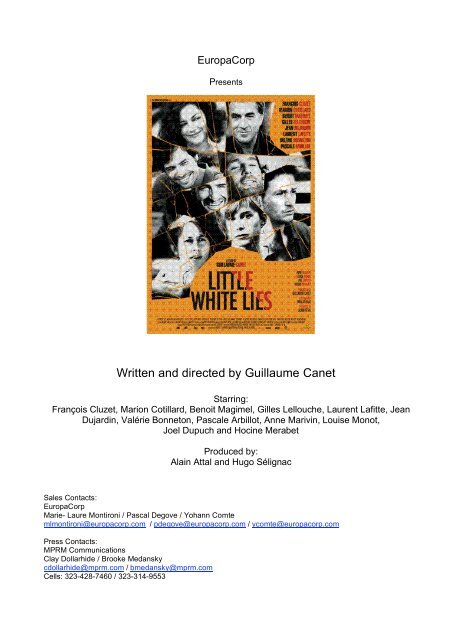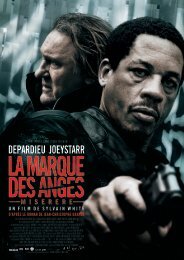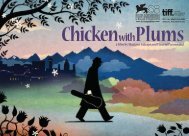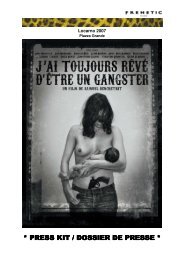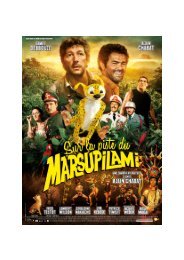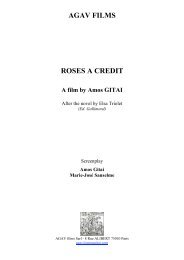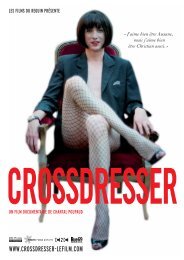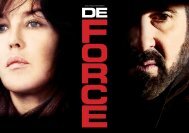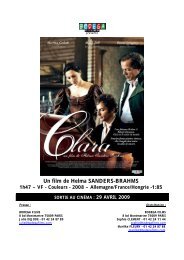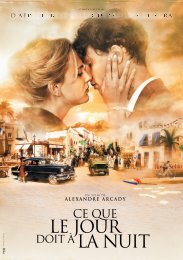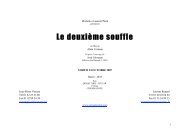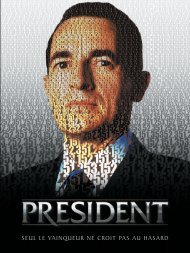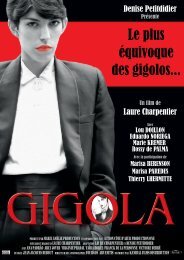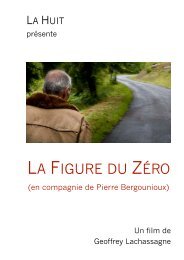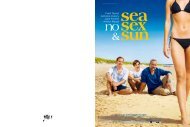LITTLE WHITE LIES Press Kit - Unifrance
LITTLE WHITE LIES Press Kit - Unifrance
LITTLE WHITE LIES Press Kit - Unifrance
You also want an ePaper? Increase the reach of your titles
YUMPU automatically turns print PDFs into web optimized ePapers that Google loves.
EuropaCorp<br />
Presents<br />
Written and directed by Guillaume Canet<br />
Starring:<br />
François Cluzet, Marion Cotillard, Benoit Magimel, Gilles Lellouche, Laurent Lafitte, Jean<br />
Dujardin, Valérie Bonneton, Pascale Arbillot, Anne Marivin, Louise Monot,<br />
Joel Dupuch and Hocine Merabet<br />
Produced by:<br />
Alain Attal and Hugo Sélignac<br />
Sales Contacts:<br />
EuropaCorp<br />
Marie- Laure Montironi / Pascal Degove / Yohann Comte<br />
mlmontironi@europacorp.com / pdegove@europacorp.com / ycomte@europacorp.com<br />
<strong>Press</strong> Contacts:<br />
MPRM Communications<br />
Clay Dollarhide / Brooke Medansky<br />
cdollarhide@mprm.com / bmedansky@mprm.com<br />
Cells: 323-428-7460 / 323-314-9553
EUROPACORP<br />
LES PRODUCTIONS DU TRÉSOR PRESENT<br />
<strong>LITTLE</strong> <strong>WHITE</strong> <strong>LIES</strong><br />
A coproduction<br />
CANEO FILMS<br />
LES PRODUCTIONS DU TRESOR<br />
EUROPACORP<br />
M6 FILMS<br />
With the participation of<br />
CANAL +<br />
CINECINEMA<br />
M6<br />
In association with<br />
COFINOVA 6<br />
and<br />
COMPAGNIE CINEMATOGRAPHIQUE EUROPEENNE<br />
PANACHE PRODUCTIONS<br />
FRANÇOIS CLUZET<br />
MARION COTILLARD<br />
BENOÎT MAGIMEL<br />
GILLES LELLOUCHE<br />
JEAN DUJARDIN<br />
LAURENT LAFITTE<br />
VALÉRIE BONNETON<br />
PASCALE ARBILLOT<br />
ANNE MARIVIN LOUISE MONOT<br />
JOEL DUPUCH HOCINE MERABET<br />
With the friendly participation of<br />
MATTHIEU CHEDID<br />
AND<br />
MAXIM NUCCI<br />
Director of Photography<br />
CHRISTOPHE OFFENSTEIN<br />
EDITING<br />
HERVÉ DE LUZE<br />
SOUND<br />
PIERRE GAMET<br />
JEAN GOUDIER<br />
JEAN-PAUL HURIER<br />
MARC DOISNE
PRODUCTION DESIGNER<br />
PHILIPPE CHIFFRE<br />
COSTUMES<br />
CARINE SARFATI<br />
SCREENPLAY AND DIALOGUES BY<br />
GUILLAUME CANET<br />
LINE PRODUCER<br />
HUGO SÉLIGNAC<br />
PRODUCED BY<br />
ALAIN ATTAL<br />
A FILM BY<br />
GUILLAUME CANET
SYNOPSIS:<br />
Despite a traumatic event, a group of friends decide to go ahead with their annual beach vacation. Their<br />
relationships, convictions, sense of guilt and friendship are sorely tested.<br />
They are finally forced to own up to the little white lies they have been telling each other.<br />
Directed by Guillaume Canet and starring: François Cluzet, Marion Cotillard, Benoît Magimel, Gilles<br />
Lellouche, Jean Dujardin, Laurent Lafitte, Valérie Bonneton and Pascale Arbillot
DIRECTORS STATEMENT:<br />
Les Petits Mouchoirs (Little White Lies) is my third feature as a director and the most personal of the three.<br />
For this reason, I insisted on writing it alone and the process was uniquely intense. I say that it's a personal<br />
film because the subject matter is particularly close to me. It's close to people of my generation while<br />
resonating with younger and older people.<br />
Deceiving yourself comes very easy. It allows you to convince yourself you're right, to bury or shelve issues<br />
that are too painful to confront. It's when we develop the annoying, self-defeating habit of telling "little white<br />
lies".<br />
This film talks about people who have accepted their life, job or sexuality without ever wondering if it's really<br />
what they want from life or if they really are happy in their relationship.<br />
Through cowardice, force of habit or fear of the unknown, we often go through life without tackling these<br />
issues, without listening to our instincts or convictions and, above all, without listening to what our heart tells<br />
us.<br />
The importance of learning to listen is what I wanted to show through the characters in the film. They all<br />
have a weakness, a lie they've buried and don't want to own up to.<br />
An awful incident, like the one they are confronted with, forces them to face up to their lies.<br />
I wanted to set this story in an atmosphere of comedy and friendship. But comedy underpinned with<br />
seriousness, and so with important nuances in the tone of the film as we switch from almost slapstick<br />
scenes to others that are, I hope, very touching.<br />
I grew up with movies like Lawrence Kasdan's The Big Chill, John Cassavetes' Husbands and Yves Robert's<br />
Nous irons tous au paradis. They continue to be a source of inspiration, not just in their humor, but also in<br />
the sincerity their characters exude.<br />
That's why, in this movie, I wanted to be as credible as possible in the portrait of friendships, for that<br />
credibility to fill every scene.<br />
Casting the movie, I chose people I like and admire, who share one vital qualification for being in the film—<br />
they all know each other.<br />
I insist on the fact that it's a personal film because it's so close to me. Either I see myself in the characters or<br />
I've met people just like them.
An Interview with Guillaume Canet<br />
You seem in a state of heightened emotion...<br />
Yes, it's very strange. I've never felt like this before about a movie I directed. I've made two shorts and three<br />
features, including Little White Lies, which isn't a lot but enough to be able to say that from the beginning<br />
this movie has been very special for me.<br />
Apparently, after Tell No One, you had quite a turbulent time personally. Is that what led you to write Little<br />
White Lies?<br />
Turbulent, maybe not, but I experienced what you could call a crucial period in my life, for sure. After Tell No<br />
One, I went through several different stages, due to my age partly. At 35, you don't look at things the same<br />
way as when you're 20, you've already taken a few knocks. I decided to enter a process of analysis—a fairly<br />
time-consuming process that was more productive than I could ever have imagined because it resulted in<br />
me writing this script in under five months. That's what makes the movie so special for me. I cannot make a<br />
more personal movie than Little White Lies.<br />
What triggered this process of analysis?<br />
Realizing how much I'd deceived myself over the years about what I really wanted, and how much energy I'd<br />
devoted to my work to avoid having to think about things. It was convenient to close my eyes to bothersome<br />
personal issues I didn't want to acknowledge. The tipping-point came when I was finishing Tell No One. I got<br />
sick. Shooting and editing the movie had taken so much out of me that I picked up the first virus going. It<br />
developed into septicemia and I spent a month in the hospital. When I got out, I went straight into a good old<br />
depression. I eventually realized that my whole existence couldn't begin and end with my work and that I<br />
was allowed to take the time to enjoy life.<br />
The film shows the damage feelings of guilt can cause...<br />
I have a relationship with guilt that most likely comes from my childhood—the major and minor dramas that<br />
occur at that age. When I realized that, I had to drive it all out and that made me feel so much better. I can't<br />
admit to making such a personal movie without admitting publicly that I went through that stage.<br />
What were the initial benefits?<br />
I realized a bunch of things that allowed me to focus on what I really wanted. I realized which friends really<br />
counted for me. I straightened out my life.<br />
And the idea for Little White Lies began to take shape?
Summer 2008, I began to play around with the idea while I was working on another screenplay totally<br />
unconnected to my inner turmoil of that time. I was sharing a house with a friend for a few days and I started<br />
throwing out stuff that was buzzing around my head, especially the fact that I'd always wanted to make a<br />
"friends movie." The more I talked, and the more she listened, I realized that in fact a film was being born. I<br />
asked my friend to be my midwife for the next five days. She listened, asked questions, reacted, and I'd take<br />
notes. I owe her so much because right away I had the structure of the movie. I scribbled scenes down in<br />
my trailer on the set of Farewell as soon as I had some time between takes. Writing had never come so<br />
easy to me.<br />
Is it fair to say there's a little of you in each character?<br />
Yes, a little bit in each. A lot of what's said in the movie comes from my life. Afterwards, of course, it's<br />
reworked and fictionalized to become part of a story. Even so, writing the script of Little White Lies got quite<br />
painful because it dug so deep into personal experiences and made me relive so many emotions.<br />
The film has the audience constantly torn between crying and laughing.<br />
Yes, we walk a very fine line. Everybody's been in tragic situations where laughter suddenly breaks out.<br />
That's what I wanted to capture. The situation the characters find themselves in forces them through a whole<br />
range of emotions and feelings. I wanted to show how a vacation is often the chance to let off steam, and so<br />
provokes all kinds of reactions, some comic, some dramatic.<br />
When did you sense that everything had clicked together?<br />
Probably after the first table-read when François Cluzet said to me, pretty emotionally, You know, there's a<br />
bunch of scenes where you don't know whether to laugh or cry. I knew then I was on the right track.<br />
The film's central theme is lies...<br />
More specifically, the lies people tell themselves and, collaterally, each other—everything we don't want to<br />
see in ourselves, that we try to gloss over.<br />
At the beginning, the characters spend a lot of time dodging their real issues.<br />
Yes, like a lot of people at various points in their lives. Is this truly my dream job? Do I truly love the person I<br />
live with? Is my sexuality what I truly wanted? I don't use the word "truly" by chance. It's the key word. And<br />
those questions are relevant at any age.<br />
And the characters are so universal, it's easy to identify alternately with one then the other.
That's what I was aiming for. I wanted to make a cross-generational movie. Even the children's characters<br />
are based on what I felt when I was 5-10 years old, surrounded by grown-ups. There's a lot of me in all of<br />
these characters. I approached writing them with a lot of honesty and sincerity, which I think is why people<br />
seem to relate to them easily. You always have to put something of yourself into a story. What's true and<br />
real for you, can be true and real for somebody else. At the very least, it's authentic because it's personal.<br />
What was the movie like to shoot?<br />
It was a very intense feeling but complicated because I wanted the actors to feel what I had felt when I was<br />
writing. I was pretty obsessive, asking them to say the lines exactly as I had imagined and written them. I've<br />
never thrown myself into a movie with such passion<br />
You put a heap of passion into Tell No One...<br />
Tell No One is a movie I love, but I think Little White Lies is a more personal and accomplished movie that,<br />
without sounding pretentious, gives me a particular sense of pride. I find the characters particularly touching.<br />
They inspire that passion in me.<br />
It's also a film about friendship...<br />
I freely admit to drawing inspiration from great movies about groups of friends like The Big Chill (1984),<br />
which is probably the reference for me. There's also Jean-Marie Poiré's Mes meilleurs copains (1988) and<br />
Yves Robert's Un elephant ça trompe énormément (1976). Cassavetes' Husbands... And a stack of movies<br />
by Claude Sautet.<br />
Making a movie about a group of friends must be easier when you're working with real-life friends.<br />
Sure. Gilles (Lellouche), Marion (Cotillard) and the crew that's worked with me since my very first short films,<br />
we go back a long way now. Then there's François (Cluzet) and Benoît (Magimel)... Same goes for Jean<br />
Dujardin—we realized we'd been to kindergarten and primary school together when both our families lived in<br />
Les Yvelines, outside Paris. I'd completely forgotten that. He reminded me at the premiere of Mon idole<br />
(2002). Do you remember Mrs. Pichon? And Mrs. Copeck? No kidding I remembered them. We couldn't get<br />
over it!<br />
So it's a film about a bunch of friends made with a bunch of friends, on whom you nonetheless made certain<br />
demands.<br />
When I offered them each a part, there were two conditions. Prior to shooting in August, I asked them to<br />
keep open five days in May to immerse ourselves in Cap Ferret. That way, I got to take everybody to the<br />
house where we'd be shooting. I wanted them to live there, to open cupboards and know where the coffee
was, the knives and forks, and so on. I wanted it to be ingrained, so that the boat trips would look natural, so<br />
that the beach restaurant would be familiar to them. When we went back to Cap Ferret in August, they<br />
already felt like they'd been there on vacation.<br />
You also wanted them to get to know each other...<br />
Exactly. So that the on-screen couples would take shape and they'd get to know the kids playing their<br />
children. The second condition was that I asked for everybody to be present throughout the shoot. I wanted<br />
them to stay there, to be part of the group 24/7, and to be available for improvised shots if the need arose. I<br />
didn't want the story to be acted out, I wanted them to live it.<br />
You used two cameras on set the whole time. Why?<br />
So that the actors would be as free as possible. So that, in group scenes, they could get up from the table to<br />
get a glass from the kitchen if they wanted without worrying about entering or leaving the frame. Then, in<br />
editing, I put the film together out of a vast amount of footage. To a certain extent, that's how I managed to<br />
make such a vibrant film with such rhythm. It was amazing how everybody got into the spirit of it and that's<br />
why this movie really touches me every time I see it. All the emotion I felt when I was writing the script<br />
comes flooding back.<br />
It also talks about missed opportunities...<br />
We all miss out on so much for the same reasons—you let your work and lifestyle get on top of you, you<br />
neglect your family, friends and relationships, while giving people the impression you're there. You know it's<br />
time to stop and think, to redefine your priorities and decide what you really want, but you don't necessarily<br />
take the time to do it, and when you finally get round to it, it may be too late.<br />
In the movie, some characters aren't able to talk about things and others talk too much because silence<br />
scares them...<br />
You're always scared you'll wreck the atmosphere by raising certain issues that may be a bit sensitive, so<br />
you don't say anything. But you wreck the atmosphere anyway! You let it slide because you think things will<br />
work themselves out. The "little white lies" are the rug you sweep all the crappy stuff under, until eventually it<br />
begins to show. When it all comes out, it can be gruesome, as it is for some of the characters in the movie<br />
when they finally have to face the truth.<br />
The oyster-farmer plays a crucial role as the catalyst...
Jean-Louis is the group's conscience, the guy who's not afraid to speak his mind. He's a man of integrity<br />
who lives a simple life. He's been observing them carefully, he likes them all and he has a big heart, but he<br />
won't give them an easy ride. He brings them face-to-face with their contradictions and their cowardice.<br />
He's played by Joël Dupuch, who is...<br />
A real-life oyster-farmer from Cap Ferret. And a friend. He's outstanding, pitch-perfect, a complete<br />
revelation!<br />
Gilles Lellouche plays the second-rate actor constantly making his life sound bigger and better than it is.<br />
He has to charm and seduce. He can't bear to show his flaws, feelings or pain, so he shows off. It's the easy<br />
way out.<br />
Is this your most polished movie?<br />
Technically and in terms of directing actors, I'd say so, yes. But all along, I kept realizing how much I still had<br />
to learn!
GUILLAUME CANET - FILMOGRAPHY<br />
DIRECTOR<br />
2009 LES PETITS MOUCHOIRS (<strong>LITTLE</strong> <strong>WHITE</strong> <strong>LIES</strong>)<br />
2006 NE LE DIS A PERSONNE (TELL NO ONE)<br />
Screenplay: Guillaume Canet and Philippe Lefèbvre based on the novel by Harlan Coben<br />
Awards :<br />
César 2007 – Best Director<br />
César 2007 – Best Score: -M- (Matthieu Chedid)<br />
César 2007 – Best Actor: François Cluzet<br />
César 2007 – Best Film Editing : Hervé de Luze<br />
Victoire de la musique 2007 - Victoire de la musique of the best original soundtrack of the Year : -M-<br />
(Matthieu Chedid)<br />
2002 MON IDOLE (WHATEVER YOU SAY)<br />
Screenplay : Guillaume Canet and Philippe Lefèbvre<br />
Nominations:<br />
César 2003 - Nomination Best first Film<br />
César 2003 - Nomination Best Actor for François Berléand<br />
2000 AVALANCHE (Short Film)<br />
Co-director with Jean-Christophe Pagnac<br />
1995 SANS REGRET (Short Film)<br />
1998 JE T’AIM (Short Film)<br />
1999 J’PEUX PAS DORMIR (Short Film)
An Interview with Marion Cotillard<br />
Guillaume always has plenty of ideas and stories that he'd like to make into movies. He'd been mulling over<br />
a film about a group of friends, and more broadly about our generation, for a long time. Three years ago,<br />
that desire began to take shape and he started writing the script for Little White Lies.<br />
I followed the process from near and afar depending on my own schedule. Early on, he mentioned that he<br />
wanted us to work together. When I read the first draft. I was immediately touched by the way he gets under<br />
the surface of how we interact, and by the subtlety, honesty and sincerity of what he was trying to say.<br />
Guillaume is very observant, with a highly developed artistic sensitivity. He has created a group of<br />
believable, close-knit characters.<br />
The process of creation<br />
The preparation period was very productive. Guillaume is a very hard worker. He creates a structure that he<br />
controls down to the tiniest detail, providing his actors with a very solid foundation. He lets us into his world<br />
while giving us the freedom to express ourselves, to add little bits of ourselves.<br />
We spent time with him individually, discussing his vision of our characters. Then he got us together for a<br />
series of table-reads in Paris, which resulted in certain adjustments to establish the balance between the<br />
various characters.<br />
One of the most inspiring moments was the few days we spent in Cap Ferret in the house where we would<br />
be shooting the movie. It was an opportunity to share our insights and get to know each other better. It was<br />
important to develop a group dynamic and genuine friendships.<br />
We had all worked on a picture of our characters' lives, what drives them and how they get on with each<br />
other, how they all met—their back stories as individuals and as part of the group. It's the kind of thing you<br />
don't see on screen that adds depth and underlying energy to the characters. We told each other our<br />
characters' life stories. It was a very moving moment, as if we were witnessing the birth of our characters<br />
and what bonds them.<br />
On set, Guillaume constructs a space where everything possible is done to make the actors feel confident<br />
and at ease. A director who so deeply knows and understands actors makes the job very easy, even<br />
exhilarating. There were times when we felt like we simply weren't acting anymore.<br />
Marie<br />
Marie's an ethnologist. She studies human beings thousands of miles away to avoid having to face her own<br />
inner turmoil. Marie's scared. She runs.
The trouble is, around the age of thirty, you reach a stage where new priorities emerge after a period of<br />
taking life as it comes. There is a need, partly driven by fear, to take stock. It's a turning point that forces you<br />
into a little bit of soul-searching.
MARION COTILLARD<br />
Academy Award winner Marion Cotillard is internationally renowned for her unbridled commitment to her art,<br />
challenging herself with each new role.<br />
She can currently be seen in Chris Nolan's "Inception," a contemporary sci-fi action thriller set within the<br />
architecture of the mind. Cotillard will play opposite Leonardo DiCaprio, portraying his wife, 'Mal.' The film's<br />
cast also includes Ellen Page, Cillian Murphy and Joseph Gordon-Levitt.<br />
This Fall, Cotillard will be seen co-starring in Guillaume Canet's, ”Little White Lies,” which he also co-wrote<br />
The film follows a sucessful restaurant owner and his eco-friendly wife who stage a grand vacation for<br />
friends at their beach house. The vacation leads to a moment when the mood sobers as characters begin to<br />
confess their innermost concerns. The film is set to be released in France October 2010.<br />
She is currently in production on Woody Allen's "Midnight in Paris," starring opposite Rachel McAdams and<br />
Owen Wilson. The film is a romantic comedy that explores the illusion people have that a life different from<br />
their own is better. Following that, Cotillard will start production on Steven Soderbergh's "Contagion,"<br />
opposite Jude Law, Matt Damon and Kate Winslet. The action-drama is centered on the threat posed by a<br />
deadly disease and an international team of doctors contracted by the CDC to deal with the outbreak.<br />
Upcoming, Cotillard is attached to star opposite Colin Farrell in David Cronenberg's "Cosmopolis," an<br />
adaptation of Don DeLillo's novel, a thriller that follows a multimillionaire on a 24-hour odyssey across<br />
Manhattan.<br />
In 2008, Cotillard became the second French actress to ever win an Oscar®, and the first to win an acting<br />
award for a performance in the French language. The praise came for her riveting portrayal of legendary<br />
French chanteuse, Edith Piaf, in the film La Vie En Rose. Of her performance, New York Times film critic<br />
Stephen Holden wrote, Cotillard gives “the most astonishing immersion of one performer into the body and<br />
soul of another I've ever encountered in film.” For her role, Cotillard also received a Best Actress BAFTA,<br />
Golden Globe and César Award as well as a Screen Actors Guild and Critics Choice Award nomination.In<br />
addition, she was named Best Actress by critics organizations worldwide, including the Los Angeles Film<br />
Critics Association and the London Film Critics Circle.<br />
Cotillard's credits include the successful French "Taxi" film series, written by Luc Besson; Yann Samuell's<br />
"Love Me If You Dare;" and Tim Burton's "Big Fish." She garnered her first César Award for Best Supporting<br />
Actress, for her performance in Jean-Pierre Jeunet's "A Very Long Engagement." Following that, she went<br />
on to star in Ridley Scott's "A Good Year;" Michael Mann's "Pubilc Enemies" and Rob Marshall's "Nine," the<br />
screen adaptation of the hit musical. Her performance in the film brought her Golden Globe and Critics'<br />
Choice Award nominations, and she also shared in a SAG Award ® nomination for Outstanding Motion<br />
Picture Cast Performance.
In 2010, Cotillard was named a Knight of the Order of Arts and Letters, for her contribution to the enrichment<br />
of French culture. Born in Paris, Cotillard studied drama at Conservatoire d'Art Dramatique in Orléans.
Marion COTILLARD<br />
2010 « NINE » - Golden Globes nomination for the Best performance by an actress in a motion<br />
picture, musical or comedy<br />
Critics Choice Award nomination for Best supporting Actress<br />
2008 « LA VIE EN ROSE » - Oscar of the best actress in a leading role.<br />
Golden Globes: Best Performance by an Actress in a Motion Picture - Musical or Comedy.<br />
César of the best actress.<br />
BAFTA of the best actress.<br />
2005 “Un Long Dimanche de Fiançailles” by Jean-Pierre JEUNET - César of the best actress in a<br />
supporting role<br />
1994 First Price at the Conservatory of Orléans<br />
CINEMA<br />
2010 MIDNIGHT IN PARIS Woody ALLEN<br />
2009 LES PETITS MOUCHOIRS Guillaume CANET<br />
INCEPTION Chris NOLAN<br />
LE DERNIER VOL DE LANCASTER Karim DRIDI<br />
2008 NINE Rob MARSHALL<br />
PUBLIC ENEMIES Michael MANN<br />
2005 LA VIE EN ROSE Olivier DAHAN<br />
A GOOD YEAR Riddley SCOTT<br />
DIKKENEK Olivier VAN HOOFSRADT<br />
FAIR PLAY Lionel BAILLIU<br />
TOI ET MOI Julie LOPES CURVAL<br />
MARY Abel FERRARA<br />
2004 EDY Stéphan GUERIN-TILLIE<br />
LA BOITE NOIRE Richard BERRY<br />
MA VIE EN L’AIR Rémi BEZANCON<br />
SAUF LE RESPECT QUE JE VOUS DOIS Fabienne GODET<br />
CAVALCADE Steve SUISSA<br />
2003 UN LONG DIMANCHE DE FIANCAILLES Jean-Pierre JEUNET<br />
NARCO Tristan & Gilles<br />
L’ÉCOLE Lucille HADZIHALILOVIC<br />
BIG FISH Tim BURTON<br />
2002 JEUX D’ENFANTS Yann SAMUELL<br />
TAXI III Gérard KRAWCZY<br />
2001 LES JO<strong>LIES</strong> CHOSES Gilles PAQUET-BRENNER<br />
Nomination for the César 2002 for the best hope as an actress<br />
UNE AFFAIRE PRIVÉE Guillaume NICLOUX<br />
TAXI II Gérard KRAWCZYK<br />
LISA Pierre GRIMBLAT<br />
DU BLEU JUSQU ‘EN AMÉRIQUE Sarah LEVY<br />
FURIA Alexandre AJA<br />
GUERRE DANS LE HAUT PAYS Francis REUSSER<br />
TAXI Gérard PIRES<br />
Nomination for the César 1999 for the best hope as an actress<br />
LA BELLE VERTE Coline SERREAU<br />
COMMENT JE ME SUIS DISPUTÉ… Arnaud DESPLECHIN<br />
L’HISTOIRE DU GARÇON QUI VOULAIT QU’ON L’EMBRASSE<br />
Philippe HAREL
TELEVISION<br />
LES AMANTS Laurent CARCELES<br />
INTERDIT DE VIEILLIR Dominique TABUTEAU<br />
TEO LA TENDRESSE Yves AMOUREUX<br />
CHLOÉ (Rôle : Chloé) Dennis BERRY<br />
HIGHLANDER Dennis BERRY<br />
EXTRÊME LIMITE Bernard DUBOIS<br />
SHORT MOV IE<br />
DOGGY DOG Olivier MEGATON<br />
LA SURFACE DE RÉPARATION Valérie MULLER<br />
L’APPEL DE LA CAVE Mathieu MERCIER<br />
LA SENTENCE Mauro LOSA<br />
AFFAIRE CLASSÉE Jean-Luc GALISSAIRE<br />
LA MOUETTE Nils TAVERNIER<br />
KEO Olivier VAN HOOFSTADT<br />
INSALATA MISTA Emmanuel HAMON<br />
LE JEU Julien RASSAM<br />
SNUFF MOVIE Olivier VAN HOOFSTADT<br />
LA FÉE ELECTRIQUE Eric WORETH<br />
THEATRE<br />
Y’A DES NOUNOURS DANS LES PLACARDS Laurent COTILLARD<br />
Choreographic Play<br />
Contemporaneous Theater of Danse
An Interview with Gilles Lellouche<br />
Little White Lies is my fifth movie with Guillaume. We met at Alain Attal's company Les Productions du<br />
Trésor. It was late at night. I was writing Narco and he was working on the script of Mon Idole. It was just<br />
after Vidocq was released and he was pretty down. It was soon after The Beach with Leo DiCaprio, too, so<br />
there was always a horde of people hovering around him. We talked most of the evening, openly and<br />
honestly, and I was struck by how insightful he was.<br />
His development as a director has been spectacular. In Mon idole, you can pick out his influences (Paul<br />
Thomas Anderson, Martin Scorsese...). In Tell No One, it's already much less obvious. Formal issues are<br />
less important to him than the story. Directing isn't Guillaume being a pretentious actor, it's a real necessity<br />
for him. He injects life into his art. When I met him, he carried around a notebook and jotted down anything<br />
that could be a good idea for a movie or a scene even, that he had yet to write, of course.<br />
A timeless, universal tale<br />
Cap Ferret has been our base camp for the last ten years. All the characters draw to a greater or lesser<br />
extent on episodes that happened there or people we met there. But the strength of Guillaume's movie is<br />
that he has transcended the raw material. Nothing is anecdotal. It's not a movie about our vacation with<br />
comic book plotting. It's a timeless, universal tale.<br />
I play a second-rate actor, a superficial poser and womanizer. He's a good friend, with the good grace not to<br />
burden the others with his problems. Eric is the dynamo of the group.<br />
In Little White Lies, Guillaume isn't far from what Claude Sautet used to do. He's always liked movies with<br />
groups of friends. He asked us all to watch The Big Chill again, and John Cassavetes' Husbands. Making a<br />
movie with eight characters, of roughly equal importance, is a real challenge and, when you see the result,<br />
he has succeeded brilliantly.
GILLES LELLOUCHE<br />
Training<br />
1992-95 Florent European Acting School<br />
Professors : Bruno Colomb, Michel Harfaut, Raymond Acquaviva<br />
Theatre<br />
1994 "BEAUCOUP DE BRUIT POUR RIEN" directed by Philippe Viallat<br />
By W. Shakespeare<br />
1995 "GLENGARRY GLENN ROSS" directed by Romain Barret<br />
By D. Mamet<br />
Cinema<br />
1997 "FOLLE D’ELLE " Jérôme Cornuau<br />
1998 "MES AMIS " Michel Hazanavicius<br />
2001 "MA FEMME EST UNE ACTRICE" (MY WIFE IS AN ACTRESS)<br />
Yvan Attal<br />
2002 "MON IDOLE" (WHATEVER YOU SAY) Guillaume Canet<br />
"MIEUX QUE LA VIE" (LOVE ME IF YOU DARE) Yann Samuell<br />
2003 "NARCO" (THE SECRET ADVENTURES OF GUSTAVE Klopp)<br />
Tristan Aurouet & Gilles<br />
Lellouche<br />
2004 "ANTHONY ZIMMER" Jérôme Salle<br />
"MA VIE EN L’AIR" Rémi Bezançon<br />
2005 "NE LE DIS A PERSONNE" (TELL NO ONE) Guillaume Canet<br />
"ON VA S’AIMER" Ivan Calbérac<br />
2006 "LE HEROS DE LA FAMILLE" (FAMILY HERO) Thierry Klifa<br />
"MA PLACE AU SOLEIL" (MY PLACE IN THE SUN) Eric de Montalier<br />
"MA VIE N’EST PAS UNE COMEDIE ROMANTIQUE"<br />
(IT HAD TO BE YOU) Marc Gibaja<br />
"LE DERNIER GANG" (MASKED MOBSTERS) Ariel Zeitoun
"PARIS" Cédric Klapisch<br />
2007 "LA CHAMBRE DES MORTS" (ROOM OF DEATH) Alfred Lot<br />
"LE PREMIER JOUR DU RESTE DE TA VIE"<br />
(THE FIRST DAY OF THE REST OF MY LIFE) Rémi Bezançon<br />
"SANS ARME, NI HAINE, NI VIOLENCE"<br />
(THE EASY WAY) Jean-Paul Rouve<br />
2008 "L’INSTINCT DE MORT" (KILLER INSTINCT) Jean-François Richet<br />
2009 "KRACH" (TRADER GAMES) Fabrice Genestal<br />
"UNE PETITE ZONE DE TURBULENCES" Alfred Lot<br />
(A SPOT OF BOTHER)<br />
2009 "LES PETITS MOUCHOIRS"(<strong>LITTLE</strong> <strong>WHITE</strong> <strong>LIES</strong>) Guillaume Canet<br />
"LES AVENTURES EXTRAORDINAIRES Luc Besson<br />
D’ADELE BLANC-SEC"<br />
(THE EXTRAORDINARY ADVENETURES OF ADELE BLANC-SEC)<br />
2010 "A BOUT PORTANT" Fred Cavayé<br />
Television<br />
"MA PART DU GATEAU" Cédric Klapisch<br />
"AU ROYAUME DES AVEUGLES" Tristan Aurouet<br />
2001 "LE 17 " Eric Lavaine<br />
2003 "L’ADIEU" François Luciani<br />
2008 "UN SINGE SUR LE DOS" Jacques Maillot<br />
Arte<br />
Cast Voice<br />
2007 "LASCARS" Albert Pereira Lazaro<br />
Part : Zoran & Emmanuel Klotz<br />
Bac Films et Millimages<br />
Cannes 2009 – Semaine de la Critique (Special Screening)<br />
2008 "VOLT " Chris Williams, Byron<br />
Howard<br />
Part : Rhino Disney
Short Movies :<br />
1996 "2 MINUTES 36 DE BONHEUR " T. Aurouet, G. Lellouche<br />
1997 "AH, LES FEMMES" Nicolas Houres<br />
1999 "UN ARABE OUVERT" (m.m.) Hervé Lasgoutte<br />
"LA TARTE AUX POIREAUX" Lionel Pouchard<br />
1998 "UN ANGE PASSE" Lionel Pouchard<br />
2001 "BOOMER" Karim Adda<br />
"PASSKEU" Gilles Lellouche<br />
2002 "VARSOVIE 1925 – PARIS 2000 " Idit Cebula<br />
2006 "J’AI PLEIN DE PROJETS" Karim Adda<br />
- Grand prix 2007 of the Alpes d'Huez Film Festival<br />
- Best Director Award 2007 - International Film Festival of Valenciennes<br />
- Jury Prize 2007 Velizy Film Festival<br />
2007 "LA 17 e MARCHE" Karim Adda<br />
Canal+ collection<br />
« écrire pour un acteur : Julien BOISSELIER »<br />
- Grand prix 2008 of the Alpes d'Huez Film Festival<br />
- Best Director Award 2008 - International Film Festival of Valenciennes<br />
- Grand Prix 2008 Saint Raphaël Film Festival
An Interview with Hugo Sélignac<br />
Guillaume had such a specific vision of what he wanted that the read-throughs of the script with the cast<br />
probably took most of these well-established stars back to the days when they were starting out. Guillaume<br />
wanted the tone to be precisely as he described it, or it changed the meaning of the lines. And sometimes,<br />
when Guillaume asked them to appear in the background of certain shots, they may have felt like they'd<br />
been hired as extras. Obviously, that wasn't so and, on screen, the result speaks for itself. There is so much<br />
emotion in the scenes where the friends' interactions emerge over several shots, in the glances and<br />
expressions that Guillaume captures magnificently, not just in the dialogue. In the end, everybody agreed on<br />
this—we haven't made a film, but the film. Guillaume gets the very best out of people on set. I realized that I<br />
went into this business to work with artists like him. Unlike some directors, he applies the concept that<br />
everybody is important on a shoot. In Guillaume's eyes, every single person working alongside him has a<br />
specific role to play, from the intern to François Cluzet.<br />
The remarkable thing about Little White Lies is the universal nature of the issues the characters are<br />
wrestling with. They are valid at age 15, 35 or 65 across all of society. The sexual frustration of Pascale<br />
Arbillot's character, for example; or Benoît Magimel's character's epiphany about his true nature; Gilles<br />
Lellouche's character's chronic inability to commit; or wondering if somebody is really "the one", or if you're<br />
doing the right job, or if you can truly count on your friends, etc.<br />
People say that Little White Lies is an ensemble movie, but I prefer to describe it as the story of a group of 8<br />
friends, each of whom is the hero of his or her own story.<br />
On the shoot, my job consisted of taking the weight off Guillaume's shoulders, encouraging him to delegate<br />
as much as possible so that he could focus on the job at hand, and taking charge of fundamental logistical<br />
and technical issues, and subsidiary matters to which he would devote a half-hour of his time, like what<br />
cheese the canteen should serve for lunch, because he was genuinely concerned about the whole crew's<br />
welfare.<br />
It was very wise of Guillaume to dismiss, early on, the idea of acting in the movie as well as directing. It<br />
would have been very tricky to do both and almost impossible to offer such precise direction to the rest of<br />
the cast.<br />
It was a delight working on Little White Lies. It's a movie with heart. You come out wanting to tell people you<br />
love them.
An Interview with Alain Attal<br />
Making a movie with Guillaume is a pleasure every time. He's a very loyal man, for whom a working<br />
environment based on trust is particularly important. Little White Lies is his take on his generation and, more<br />
widely, on contemporary society. It's a movie about the damage you cause (or suffer) by constantly putting<br />
off until later the really important issues.<br />
The artistic and commercial success of Tell No One gave Guillaume the time to write the screenplay he<br />
dreamed of. And I made sure I could give him the time he needed on set and in the editing suite. The rough<br />
cut was four hours long! He insisted on putting everything he'd shot into it. I wasn't allowed to see it because<br />
he preferred to bring it down to a more customary length on his own.<br />
It's the first time since we started working together that Guillaume has attained such a level of expertise and<br />
authority. He was the captain of the ship, driven by tremendous energy. During the shoot, I noticed how<br />
astonishingly determined he was. Guillaume had never been so in control of his previous movies, in every<br />
sense—from the script (the first one he wrote alone, without Philippe Lefebvre) to the locations that he<br />
chose personally, like every single song on the soundtrack.<br />
A subtle blend of genres<br />
I decide to ask Hugo (Sélignac) to line produce. After years working together, he's got where he deserves to<br />
be. I met him when he was an intern on Selon Charlie by Nicole Garcia. He's come a long way. He learns<br />
fast and manages budgets with an innate talent. As a result, I didn't have to be on set in Cap Ferret every<br />
day. One return trip per week was enough. I received the dailies and discussed them on the phone with<br />
Guillaume.<br />
The lessons learned on Tell No One allowed him to aim once more for a subtle blend of genres. Whether<br />
he's making a thriller or a comedy, like this movie, nothing discourages him from infusing the story with<br />
emotion. He has a unique intuition, a sixth sense for what will work best in a movie. Little White Lies is the<br />
finest example of that.


